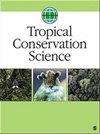了解科摩罗群岛不可持续自然资源利用的驱动因素
IF 1.6
4区 环境科学与生态学
Q2 BIODIVERSITY CONSERVATION
引用次数: 6
摘要
科摩罗群岛由于其高度的地方性而成为生物多样性的热点。然而,它是世界上森林损失率最高的国家之一,主要是由于强大的人为压力。由于科摩罗人口依赖森林资源维持生计,因此制定相关的可持续管理保护战略需要考虑多个利益攸关方对生物多样性和栖息地保护的看法。更好地理解人与自然的关系;科摩罗人如何利用自然资源以及保护区与长期生物多样性保护的相关性,我们使用q -方法论来评估当地人对生物多样性和保护行动的看法。在分析中确定了三种话语:“亲环境话语”、“维持现状”和“社会与环境关注”。结果显示,有工作的受访者对森林和生物多样性的长期保护持赞成态度。相比之下,失业的受访者赞成更直接的利益,而失业但受过教育的受访者赞成长期森林保护和森林的直接利益。这表明贫困和缺乏获得基本服务的机会与农村人口过度采伐自然资源有关。这些结果表明,科摩罗群岛的生物多样性保护可能会受益于旨在(1)发展旅游业和维持作物和牲畜的可持续生产,从而改善所有社会群体的生计和福祉;(2)开发项目,如当地市场,使村民能够出售农产品;(3)开展植树和再造林的宣传活动。重新造林可以使自然植物重新生长,并使大型树木能够长期使用。本文章由计算机程序翻译,如有差异,请以英文原文为准。
Understanding Drivers of Unsustainable Natural Resource Use in the Comoro Islands
The Comoros archipelago is a biodiversity hotspot by virtue of its high level of endemism. However, it suffers one of the highest rates of forest loss worldwide, mainly due to strong anthropogenic pressures. As Comorian populations depend on forest resources for subsistence, establishing relevant conservation strategies for their sustainable management requires the consideration of multiple stakeholders’ perspectives toward biodiversity and habitat conservation. To better understand the relationships between humans and nature; how comorian people use natural resource and the relevance of a protected area for long-term biodiversity conservation, we used Q-methodology to assess local people’s perceptions regarding biodiversity and conservation actions. Three discourses are identified during analysis: “Pro-environment discourse”, “Keeping things as usual” and “Social and environmental concerns”. According to the results, employed respondents, were favorable to long-term forest and biodiversity conservation. In contrast, unemployed respondents were in favor of more immediate benefits while unemployed but educated respondents were in favor to both long-term forest conservation and immediate benefits from forests. This suggests that poverty and a lack of access to basic services is associated with overharvesting of natural resources by rural people. These results suggest that biodiversity conservation of the Comoros archipelagos may benefit for plan aiming at (1) developing tourism and maintaining sustainable production of crops and livestock that could allow enhancing livelihoods and well-being of all social groups, (2) developing projects such as local markets that could allow villagers to sell agricultural productions, (3) setting up awareness campaign for tree-planting and reforestation. Reforestation could allow re-establishing natural plants and make large trees available for long-term purposes.
求助全文
通过发布文献求助,成功后即可免费获取论文全文。
去求助
来源期刊

Tropical Conservation Science
BIODIVERSITY CONSERVATION-
CiteScore
3.60
自引率
5.90%
发文量
16
审稿时长
>12 weeks
期刊介绍:
Tropical Conservation Science is a peer-reviewed, open access journal that publishes original research papers and state-of-the-art reviews of broad interest to the field of conservation of tropical forests and of other tropical ecosystems.
 求助内容:
求助内容: 应助结果提醒方式:
应助结果提醒方式:


